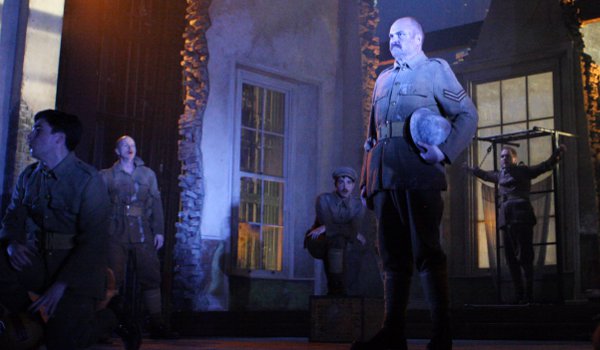AS a play that’s been described “anti-army, anti-war and anti-anyone who supports war,” Sean O’Casey’s The Silver Tassie is a work that should chime with most audiences today of a sound state of mind.
Yet it’s worth remembering that O’Casey’s 1928 piece was originally rejected as too controversial by the Abbey Theatre in Dublin and has been rarely produced since.
Dark and humorous in equal turns, it’s no surprise then when 28-year-old actor Ronan Raftery describes the play as “definitely the biggest challenge for me to date in the theatre”.
The Dubliner, who now lives in London, leads a 20-strong cast at The National Theatre tasked with giving O’Casey’s play a rare outing and, hopefully, some overdue recognition.
A regular in Sky One’s Moone Boy series and Channel Four’s Fresh Meat, Raftery plays Harry Heegan, a soldier in the First World War who receives a medal for, not only his bravery, but the injuries which shatter his hopes on returning to Ireland.
“Harry is a very dark character,” Raftery told Rí-Rá as the production opened in London.
“He is a dark character in a very dark — but also very funny — play. He is a character full of anger and vitriol who returns from war and suffers a huge fall from grace. He left as the golden boy and came home to find himself shunned by the people he knows and loves.”
The human horrors and casualties of war are unceremoniously tallied in O’Casey’s piece. Its take on the Irish contribution to the Great War — which benefits from its purposefully timed reproduction in the National — calls its audiences to question the point of war more generally.
 The National Theatre is transformed into the front line
The National Theatre is transformed into the front line“This play is absolutely anti-war, O’Casey makes no concession there whatsoever,” Raftery admits.
“It’s anti-army and anti-anyone who supports any kind of war really, which is why it was rejected almost immediately by the Abbey Theatre in the 1920s, and why it took a while for it to get produced.”
And despite its age, Raftery believes the play’s themes are as poignant in the current day as when O’Casey first committed them to paper.
“It’s an anti-war play that doesn’t have a specific go at people who support war,” Raftery suggests.
“It’s more about the inevitable tragedy of war, that there is guaranteed to be casualties, guaranteed to be deaths, guaranteed to be families ripped apart and countries destroyed. It’s anti that.”
He added: “My character, the fallen forgotten soldier, is a symbol for that message. As are the stories we all hear all the time today of soldiers of any country who come back destroyed mentally or physically by war and don’t get appropriate treatment from their government or army, or by the people that they have grown up with and love.”
He explains: “The families, friends and partners just don’t know how to deal with the experiences these men and women have gone through.”
Raftery’s character Heegan, a dashing young football star who leads his team to victory once more before heading off for the trenches, is at the blunt end of that misunderstanding when he arrives home to Ireland crippled both mentally and physically.
“It has been challenging to play the part,” Raftery admits.
“There is so much anger, fear and terror from all the experiences that these men and women have gone through and most civilians don’t know how to deal with that,” Raftery explains, “and I have to do that justice.”
“Sadly, that is actually quite a current story; people today will recognise it,” he adds.
After preparing for the production since Christmas, Raftery claims he has relished the chance to work among a largely Irish cast at the esteemed National Theatre.
He also lets slip that that acting troupe has transformed into something of a troop in itself — both on and off set.
“We are a young cast with a lot in common and of course when you dress up as soldiers every day an immediate camaraderie comes out of that kind of a situation,” he explains.
“You’re close as you do everything together; we get changed together, we eat together, we are a unit. A company of actors in that sense is not vastly different from a company of soldiers.”
That analogy may also be applicable to Irish actors working the London circuit more generally.
“It’s been a great period for Irish theatre in London these past few years,” Raftery adds, “but there are so many of us they have to put on plays for us otherwise we would all be roaming the streets.”
The Silver Tassie runs at The National Theatre until July 3. For tickets priced £15-£50 call the box office on 020 7452 3000 or visit www.nationaltheatre.org.uk

